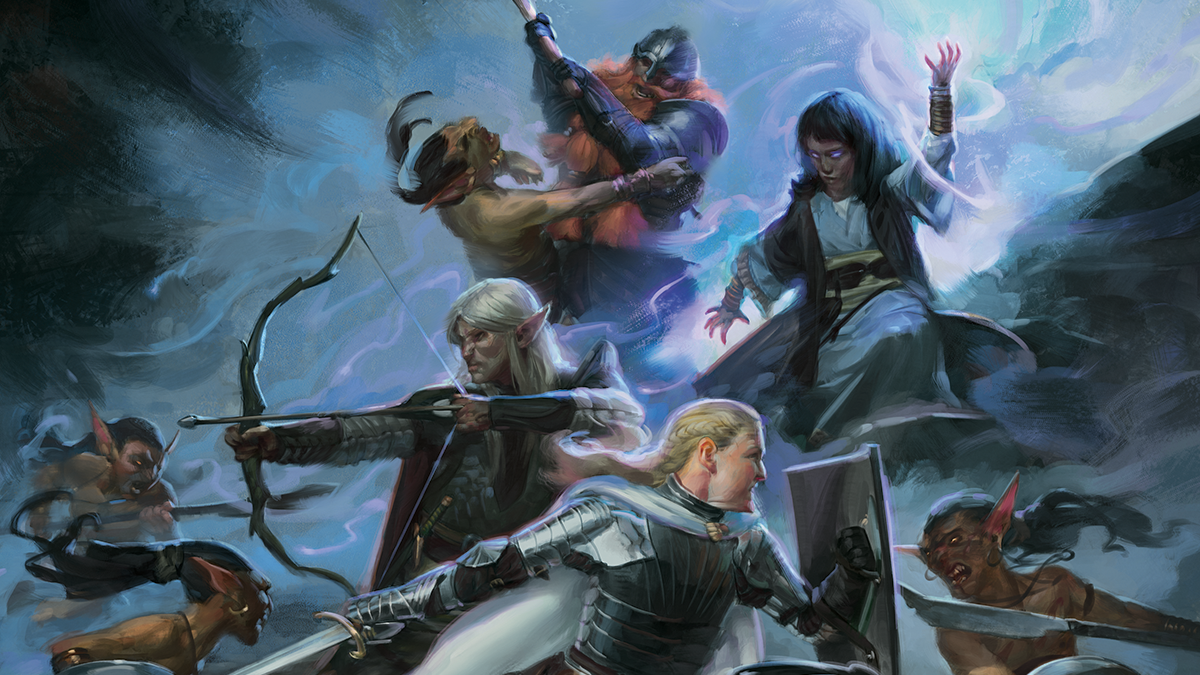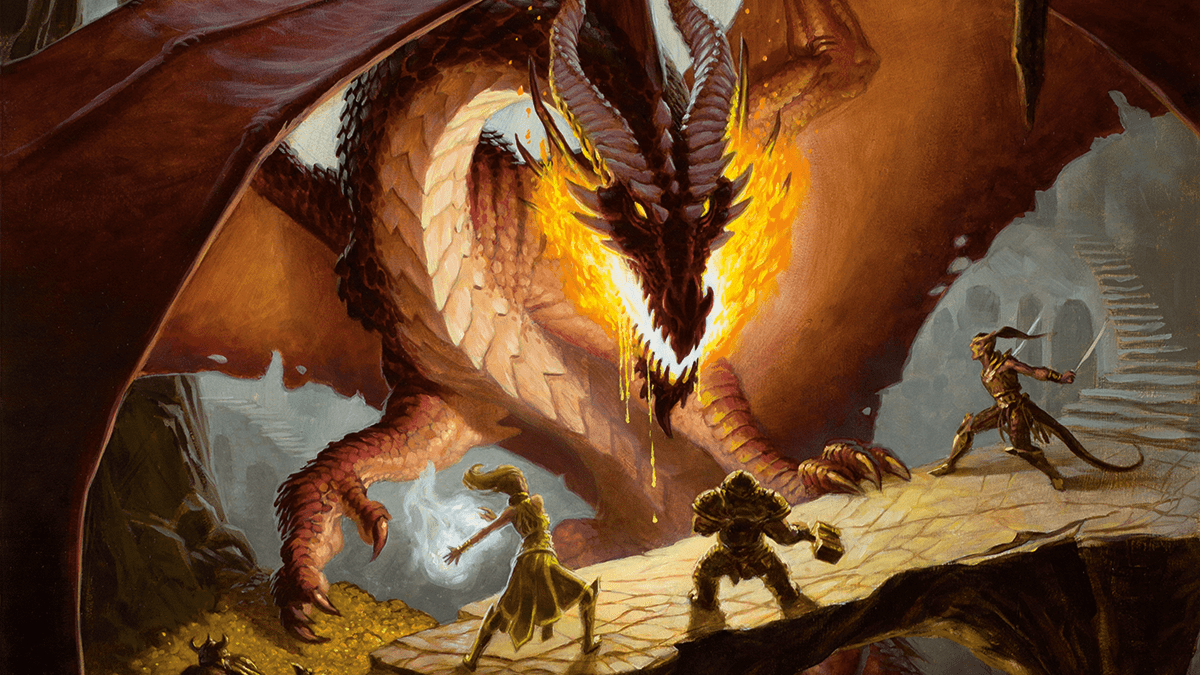When people approach Dungeons and Dragons for the first time, there are usually a few characters that players look to try out. Some want to play a tricky rogue, stabbing both enemies and their own party members in the back. Some want to be Barbarians, swinging the largest weapon a DM can homebrew into as many goblin faces as possible. Still, the class that I would wager is the most popular beginner class is the Wizard.
Wizards call upon the elements to smite their foes, using hard-earned knowledge to speak to some power deep within the rules of the world. And then you get to take that power and turn it into a big ball of fire and chuck it at people. That’s baller.
For those new to DnD, don’t fear. This guide will go over the basics of a Wizard’s stats and subclasses so that you can be the exact kind of Wizard you want to be. Further guides will go in-depth into each subclass, but for beginners, let this serve as a starting point.
Basic Wizard Features
Hit Dice and Max HP
Wizards are the quintessential glass cannon class. Wizards have hit dice equal to 1d6 + Wizard level. This means that Wizards start the game with 6 + the character’s Constitution modifier maximum HP at level 1, and gain 1d6 + Constitution modifier maximum HP every level after. This is tied with the Sorcerer class for lowest hit dice, compared to a class like Barbarian that has a hit dice of 1d12.
General Stats
Wizards use Intelligence as their primary spellcasting modifier, making it the most important stat. How this works is that Wizards use spells that use a Spell Attack Modifier or force enemies to beat their Spell Save DC, which grows stronger with your intelligence. The calculations for both are listed here:
- Spell Save DC = 8 + proficiency bonus + Intelligence modifier
- Spell Attack Modifier = proficiency bonus + Intelligence modifier
As such, Intelligence should always be the stat that you should focus on making the highest.
Constitution is also important, as it helps boost your max health, and helps Wizards maintain their concentration on spells when needed. Other stats are generally less important but may be more or less important based on the Wizard’s subclass, discussed later.

Proficiencies
Wizards have no armor proficiencies, reinforcing their role as glass cannons. They also have limited weapon proficiencies, only able to wield daggers, darts, slings, quarterstaffs, and light crossbows with proficiency. This makes it so that Wizards must rely on their spells for damage. They are proficient in saving rolls against Wisdom and Intelligence and can choose to be proficient in two of these six skills: Arcana, History, Insight, Investigation, Medicine, and Religion.
Spellcasting and the Spellbook
The obvious draw of the Wizard is their wide array of spells. At level one, a Wizard knows three cantrips, cheap repeatable spells that can always be used, and six level-one Wizard spells, all of which are kept in the Wizard’s spellbook. As Wizards level up, they will continue to gain more spells of higher levels, all of which can be stored in the Wizard’s spellbook.
However, a Wizard doesn’t have access to all these spells at once. Wizards can prepare a spell list containing Intelligence modifier + Wizard level spells to cast. The list can be prepared every time you take a long rest, meaning that while you won’t always have access to every one of your spells, you can take whichever ones you think will be the most useful for the next part of the campaign.
While Cantrips can be recast as often as a Wizard wants, spells with higher levels are limited by the Wizard’s spell slots. Wizards start with two level-one spell slots, meaning you can cast two level-one spells until you take your next long rest, after which the spell slots are renewed. As the Wizard grows in level they will get more spell slots, and spell slots of higher level, allowing you to cast higher level spells or stronger versions of lower leveled spells.

Subclasses
At level two, you unlock your Wizard subclass, arguably the most important of your choices. This guide will go over each Wizard subclass found in the base 5e rulebook and its expansions, and what you can expect each subclass to play like. Further guides will explore specific spells and builds for each subclass, which are as follows:
- Abjuration
- Bladesinging
- Chronurgy
- Conjuration
- Divination
- Enchantment
- Evocation
- Graviturgy
- Illusion
- Necromancy
- Order of Scribes
- Transmutation
- War Magic
Abjuration
The Abjuration subclass is for the Wizard that seeks to protect, rather than to harm. Abjuration is all about Wards and Counterspells, protecting friends from harm either through shielding effects or taking apart spells entirely. While they may not be the flashiest subclass, they are one of the most useful, as the amount of harm they can prevent is vast.
Bladesinging
Bladesinging means evoking an ancient Elvish technique known as the Bladesong, turning the caster into a dexterous and dangerous fighter. You gain proficiency with light armor and a one-handed melee weapon of your choosing, as well as a bonus to Armor Class equal to their Intelligence Modifier, meaning you become both more deadly and more durable in non-magical combat. For a Wizard who wants to add some melee flair to their combat, this is the go-to subclass.
Chronurgy
Chronurgy is the manipulation of time, another supportive Wizard subclass, but one with incredibly unique effects. Chronurgy Wizards can blink enemies out of space and time, or trap them in a box of frozen time. You can even prepare spells and save them as a spot in time, giving them to teammates to use later. The best Chronurgy Wizard builds are fun and quirky, playing with the rules of the game in a way that many classes never get to.

Conjuration
Conjuration Wizards make something from nothing, whether something is a fog bank to hide behind or a dangerous summon sent out to fight. The Conjuration Wizard has more utility than it does combat strength, allowing for shenanigans by making easy copies of important items or switching places with a teammate at a moment’s notice, like Aoi Todo from Jujutsu Kaisen. While you may not be a master of the battlefield, your ability to come up with creative solutions to other problems will be unending.
Divination
The school of Divination is an interesting one, allowing you to replace dice rolls, yours or opponents, with dice you had rolled previously. You can also cast higher-level spells to regain lower-level spell slots, meaning you have a lot more magical endurance than most other Wizard subclasses. For those who know what the future will hold, or just never want to stop casting, this subclass is the choice.
Enchantment
Enchantment is all about the manipulation of the mind. Use magical charms to make allies, or to distract and confuse foes. Some enemies will even fail to attack you, realizing up close that the player is just too darn endearing to kill. Enchanters can even learn to rewrite memories so that after you convince an enemy to spill all of their darkest secrets, you can make them forget they even told anyone. Incredibly diabolical, and incredibly fun.
Evocation
Evocation is Dad Magic. Cast Fireball. Do big damage. Classic. Evocation Wizards feel like the quintessential Wizard archetype, casting huge spells and laying waste to enemies with fire and brimstone, or maybe lightning if you’re feeling spicy. Even learn how to do it without burning up your allies as well. For something simple and damage-oriented for the new player, an Evocation Wizard is a perfect choice.
Graviturgy
Graviturgy, as it sounds, is the manipulation of gravity, and for the intelligent and tactical, this can be the perfect Wizard subclass. Use your spells to knock enemies around, into traps, or off cliffs by controlling movement. Maybe add a bit of oomph to an ally’s swing by adding a bit of g-force behind it. Graviturgy Wizards can use their spells in multiple ways, some subtle, and some not, making it perfect for the player who prefers to have options in their approach.
Illusion
Illusion Wizards are all about duplicity and distraction. Create sounds out of thin air to distract guards, or confuse enemies by creating a double of yourself on the battlefield. Masters of Illusion warp reality itself, letting their illusions become real, if just for a brief moment. For a Wizard that also enjoys a bit of trickery and subterfuge, the Illusion subclass will do the job.
Necromancy
Necromancy is of course focused on raising the dead, but more so focuses on the manipulation of life energy itself. Gain health back from fallen enemies, raise the dead to do your bidding, or suck the life out of everything around you on the battlefield. Necromancy is a more versatile subclass than many think and can be perfect for both the player wanting to command an army or the one who wants to wade into battle, keeping their health high and their enemies’ low.
Order of Scribes
The Order of the Scribes Wizard is an odd one and not the usual choice for the first-time Wizard. This Wizard is so connected with their spellbook that it gains sentience, becoming an extension of the player. Summon the spirit of the spellbook, and cast spells on the battlefield from both of your positions. Copy spells from the book onto scrolls, giving them more power as your connection with the Spellbook brings greater clarity. This Wizard can be powerful in the right hands but requires greater understanding.
Transmutation
A Transmutation Wizard is much like an alchemist, seeking to change the nature of things from one to the other. These wizards can change iron to gold, stop poisons, and even extend a person’s lifespan. In combat, Transmutation Wizards are about resistance to the elements, or turning something deadly into a much less dangerous beast. A weird and wild subclass.
War Magic
The War Mage is the master of the battlefield, unperturbed by a straw arrow or spells sent their way. War Mages have learned to use their magic more practically, deflecting blows and saving up power for explosive blows, using both the defensive and offensive capabilities of magic. There is no fluff here. For the player ready to brawl, and maybe take a shot or two and still be ready to come back swinging, the War Mage will be the best choice.
The ways to play a Wizard are incredibly varied, so much so that it can be overwhelming at times. Still, at this point, you should have a good grasp on Wizarding’s basics, as well as what future choices might bring. Keep reading and keep learning. Knowledge is power, and none will know that better than the enemy staring right into a flying fireball.





Published: May 3, 2024 10:50 am